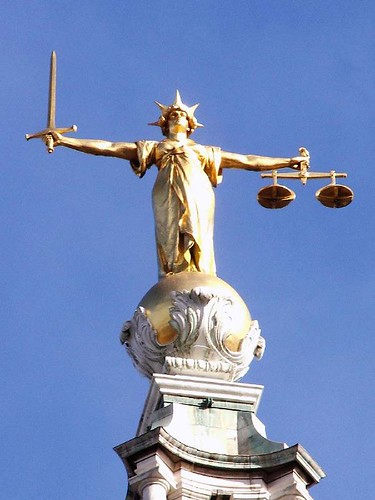 As journalism students, most of us have thought about the legal problems thrown up by widespread internet access (those of us who stick around for Media Law on Wednesday afternoons, at least).
As journalism students, most of us have thought about the legal problems thrown up by widespread internet access (those of us who stick around for Media Law on Wednesday afternoons, at least).Shane Richmond, Communities Editor for the Telegraph, touched on a thorny issue when he came to speak to us last Thursday.
Shane said contempt of court laws will be challenged by the internet, and won't survive. A seemingly dark prognosis for the British legal system.
Contempt of Court is based around a 1981 Act, and it affects journalists as its stops them from publishing, or broadcasting, anything that could prejudice a trial. It becomes active once an arrest warrant is issued, or an arrest is made.
Ensuring a defendant is tried fairly, rather than by the media, hasn't been easy for a while. No media organisation was prosecuted for coverage of the Soham murder trials, despite widespread recognition that many publications were in contempt of court by revealing a wealth of potentially prejudicial material about Ian Huntley and Maxine Carr.
Online and mobile media are making it even harder to make sure potential jurors aren't influenced by evidence they hear outside of the court room. The naming of Baby P, his mother and step-father has sadly demonstrated this.
I don't think many people would be surprised this information was in the public domain, and could be accessed by typing keywords into Google. But developments in social media and its uptake mean people have been exposed to their identities without looking for the information themselves.
My housemate received a text from a friend listing their names and addresses, and people joining facebook memorial groups unwittingly viewed comments made by other members, determined to 'shame' those involved.
The people publishing this information aren't journalists – this is a huge problem with citizen media. And if journalists aren't getting punished for risking the 'fairness' of a trial, then why should people leaving comments on a social networking site?
Barrister Clive Coleman thinks we should get rid of contempt of court laws. And Shane Richmond agrees that current plans for dealing with prejudicial information on the internet have no chance of working.
I don't think ordering news organisations to delete archives detailing information about cases before they became active is the answer.
But I also don't think we should abandon the principles behind the legislation altogether. They were established in law for a reason, and the reason remains valid. The means of enforcing the Act are insufficient, but the intention of the Act remains sound. The risk of exposing jurors to information outside the courtroom which could influence their opinion should be minimised.
The beauty of the British constitution is its evolving nature - we might not have found a way to successfully deal with the internet problem yet, but we don't have to abolish the Contempt of Court Act to bring it in step with the digital age.
Maybe New South Wales has got it right? Only time will tell.
Educational schemes could be the answer - if people understood why reporting restrictions were enforced, maybe they would think twice before blogging about a defendant's personal history.
If they understood the possible reasons why Baby P's abusers haven't been named, they might realise keeping quiet could be a better way to achieve justice.
Image courtesy of Billogs @ http://www3.flickr.com/search/?q=scale%20justice&w=31876869%40N00






